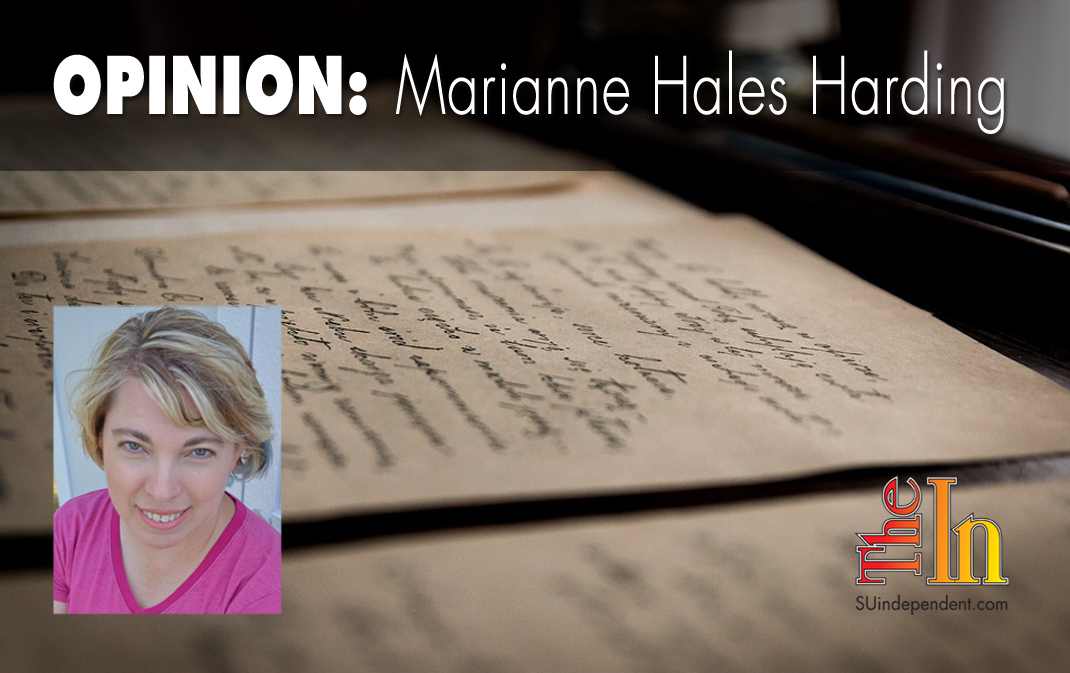 Letter to a young(ish) writer
Letter to a young(ish) writer
Recently a friend of mine asked me for advice about getting back into writing after a hiatus (in this case a hiatus impacted by having and caring for babies). I’m assuming she thought to ask me after watching me struggle with my own rusty writing muscles for years and as I thought about it I realized the answer was much more than a series of texts could convey.
Dear Sharon,
When I was in college someone said, “Don’t be a writer unless you couldn’t possibly be happy doing absolutely anything else.” We all laughed. And then I decided I couldn’t possibly be happy doing anything else and graduated and went to grad school and wrote and wrote and wrote and graduated again (this time with a super special hood) and got married and worked temp jobs and had babies and generally did absolutely anything else besides writing. I think it was after my first baby that I decided that writing just wasn’t in the cards for me. I had been diagnosed with a draining chronic disease (MS) a few years before, I was adjusting to the demands of motherhood, and I felt incredibly discouraged. I asked my husband to stop introducing me as a writer at social events because the follow up question was always “What are you working on right now?” and the answer was nothing. I was working on nothing. Well, I was working on surviving. I was working on not imploding. I was still involved with the arts community through my actor/director husband and I wondered if that would just have to be enough.
Of course it wasn’t enough. After my second baby I realized that if I didn’t find a writing outlet I really would implode. I had done a staged reading of an older play that I was revising not long before she was born and connected a little bit with the theatre community in the small town where I lived but I was pretty cut off from that community soon after that when my husband and I divorced (and he got custody of the theatre folks). I had no creative community and I was at a loss as to where to even start to look for one. I was teaching composition at the local college when two of the other instructors started a creative writing open mic. This was the English department and not the theatre department so it seemed like a place I could go. Being a playwright, I brought a short scene to share. Picture in your mind how awful it was — four non-actors doing a cold reading of a scene with only one microphone between them. It bombed so tremendously that I didn’t go back for months.
When I did return it was with a poem. Poetry is the bread and butter of open mics and it’s short enough that it’s a good fit for the piecemeal writing time that you get as a mother. For about six years I focused on poetry and essays but it was still somewhat haphazard and when you aren’t out there winning Pulitzers there is the sinking realization that you are no longer the up-and-coming young writer anymore. This hit hardest when my youngest was in school full time (a few years down the road still for you). School offers the tiniest sliver of respite from the non-stop demands of motherhood and you have a moment where you look around, Christmas-Carol-like, and envision what the Ghost of Christmas Future is going to show you. Don’t get sidetracked in trying to work that reference out to its logical conclusion. Children are only Marley’s chains around your neck when you’re at the swimming pool and they don’t know how to swim yet. My point is that, my dear Ebeneezer, it’s still Christmas morning. You still have time.
A few years ago I moved away from the small town where I had no theatre community to a bigger town with the possibility of being involved with playwriting again. I got involved with a new play development workshop, which led to an adjunct teaching position and the opportunity to work with some fantastic theatre professionals and young writers. Seeking this sort of possibility was part of the reason I moved in the first place but actually following through with it felt like refurbishing a very old boat that’s still in the water (with the ever present threat of sinking). This was never more so than this semester when I was invited to be a writer in the writer/director/actor workshop, a semester-long play development workshop at BYU. It was a great experience, in part because I re-learned some things that made me think of you and your struggles to give creative work more prominence in your life.
First, no matter how discouraged you get you have to just keep coming to the table. Swallow your pride, take your lumps, and just keep at it. Writing is intensely vulnerable and it is much, much easier to walk away. Don’t. I remember after one particularly humbling workshop I thought to myself, “I could set this aside. I have plenty of socially acceptable excuses. Or I could just keep writing.” Even if you are only writing five words a day those are five words you didn’t have yesterday, right?
Second, write every day. That’s one of those things like eating right — we all know it’s good for us and we sort of know how to do it but we still find ourselves having an ice cream dinner more often than we want to admit. If there is one thing you can do, though, to be successful in refurbishing the old boat it is this one. Carve out a regular time to write and make it sacred. Don’t even answer your phone or respond to a text. Give it your best hour when your brain is perky. This will mean letting something else drop but, if at all possible, don’t let that something be an hour of sleep. Trust me. You’ll need that sleep.
Third, give yourself some stakes; put yourself out there in a meaningful way. About a month into this workshop (when it was not going well) I realized how supremely dumb I had been. I had taken an ambitious idea and tried to form it into an ambitious piece in a forum where there was a huge possibility of landing flat on my face in front of not only my colleagues but also my students. Not my smartest choice ever! But, man, it lit a flame under me.
Fourth, get a community. You know you have me, of course, but don’t underestimate the power of having other people have a stake in your work. Writers are part courage and part crippling self-doubt so it was very helpful to have the incredibly validating situation of having a whole table full of people devote a couple of months to developing my play. It was kind of like when I went to my first IEP meeting when my oldest daughter was struggling in elementary school. When I sat down at a table full of people who all cared about helping my kid I just about cried. I felt so much less alone in the struggle. I felt that way just about every time I sat down at the workshop table to read through a new draft. Later, at the final reading of the workshop I had a few of my mommy-writer/Relief Society sisters community flanking me and my poetry community murmuring recognition when the main character read a poem they had been at the birth of. It made my anxious writer heart feel safe, which makes it easier to write, and it gave me experienced but objective eyeballs to give the perspective you can’t have when in the thick of writing. It’s worth the effort to seek that out.
Finally, remember that writing isn’t something you only do because you can’t not do it or you can’t be happy doing anything else. It’s something you choose to do for a variety of really good reasons. Trust yourself on that point. Take back that time and take back your creative self.
Love from a tiny bit further down the path,
Marianne



